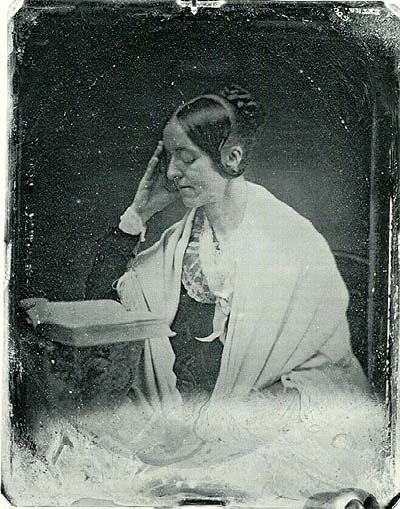Margaret Fuller najznámejšie citáty
Margaret Fuller: Citáty v angličtine
Life Without and Life Within (1859), The One In All
Kontext: Existence is as deep a verity:
Without the dual, where is unity?
And the "I am"" cannot forbear to be;But from its primal nature forced to frame
Mysteries, destinies of various name,
Is forced to give that it has taught to claim.
Life Without and Life Within (1859), The Captured Wild Horse
Kontext: p>On the boundless plain careering
By an unseen compass steering, Wildly flying, reappearing, —
With untamed fire their broad eyes glowing
In every step a grand pride showing,
Of no servile moment knowing, —Happy as the trees and flowers, In their instinct cradled hours,
Happier in fuller powers, —See the wild herd nobly ranging,
Nature varying, not changing,
Lawful in their lawless ranging.</p
Ahnungen means "Premonitions"; letter XIII to James Nathan (31 March 1845).
The Love Letters Of Margaret Fuller (1903)
Life Without and Life Within (1859), A Greeting
“You are intellect, I am life!”
To Ralph Waldo Emerson, as quoted in "Humanity, said Edgar Allan Poe, is divided into Men, Women, and Margaret Fuller" Joseph Jay Deiss in American Heritage magazine, Vol. 23, Issue 5 (August 1972).
Summer On The Lakes, in 1843 (1844) http://www.gutenberg.org/etext/11526.
Life Without and Life Within (1859), Prophecy and Fulfilment
Notes from Cambridge, Massachusetts (July 1842) published in Memoirs of Margaret Fuller Ossoli (1852), Vol. II, p. 64.
Life Without and Life Within (1859), The One In All
“I now know all the people worth knowing in America, and I find no intellect comparable to my own.”
As reported by Ralph Waldo Emerson in Memoirs of Margaret Fuller Ossoli (1884) Vol. 1, Pt. 4.
Of this comment Perry Miller states "the fact is that at Emerson's table she was speaking the truth." "I find no intellect comparable to my own" in American Heritage magazine, Vol. 8, Issue 2 (February 1957) http://www.americanheritage.com/articles/magazine/ah/1957/2/1957_2_22.shtml.
"Recipe to prevent the cold of January from utterly destroying life" (30 January 1841), quoted in Margaret Fuller Ossoli (1898) by Thomas Wentworth Higginson, p. 97.
Life Without and Life Within (1859), The One In All
Life Without and Life Within (1859), Freedom and Truth
Life Without and Life Within (1859), Sub Rosa, Crux
“Be what you would seem to be.”
English proverb, used by many authors, including some prior to Margaret Fuller's time; Thomas Fuller expresses related thoughts in his "Panegyric" on Charles II, Section 21" in The History of the Worthies of England (1662):
Be you above your ancestors renown'd,
Whose goodness wisely doth your greatness bound;
And, knowing that you may be what you would,
Are pleased to be only what you should.
Misattributed
Life Without and Life Within (1859), Flaxman
“To me, our destinies seem flower and fruit
Born of an ever-generating root…”
Life Without and Life Within (1859), The One In All
Article, The New York Daily Tribune (22 February 1845), p. 19; quoted in Brilliant Bylines (1986) by Barbara Belford.
Life Without and Life Within (1859), Sistrum
“Beware of over-great pleasure in being popular or even beloved.”
Letter to her brother, (20 December 1840) as quoted in The Feminist Papers (1973) by Alice Rossi.
“When your dreams tire, they go underground and out of kindness that's where they stay.”
Libby Houston, in the poem "Gold" in Necessity (1988).
Misattributed
“Your prudence, my wise friend, allows too little room for the mysterious whisperings of life.”
To Ralph Waldo Emerson, as quoted in "Humanity, said Edgar Allan Poe, is divided into Men, Women, and Margaret Fuller" Joseph Jay Deiss in American Heritage magazine, Vol. 23, Issue 5 (August 1972).
“Guard thee from the power of evil;
Who cannot trust, vows to the devil.”
Life Without and Life Within (1859), My Seal-Ring
“When people keep telling you that you can't do a thing, you kind of like to try it.”
Margaret Chase Smith, quoted in More Than Petticoats : Remarkable Maine Women (2005) by Kate Kennedy
Misattributed
Life Without and Life Within (1859), Sub Rosa, Crux
Letter (21 April 1850).
Memoirs of Margaret Fuller Ossoli (1852)
"American Literature" in Papers on Literature and Art (1846), p. 122.
